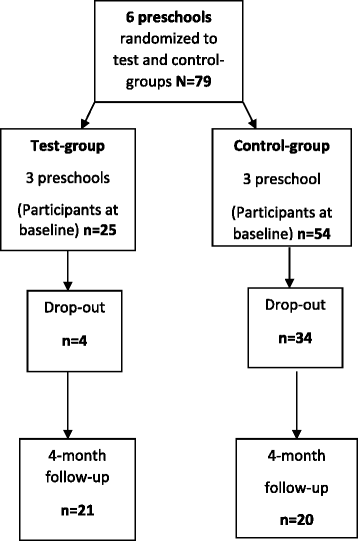The effect of motivational interviewing on oral healthcare knowledge, attitudes and behaviour of parents and caregivers of preschool children: an exploratory cluster randomised controlled study
- PMID: 26328785
- PMCID: PMC4556322
- DOI: 10.1186/s12903-015-0068-9
The effect of motivational interviewing on oral healthcare knowledge, attitudes and behaviour of parents and caregivers of preschool children: an exploratory cluster randomised controlled study
Abstract
Background: Motivational Interviewing (MI) has been used across primary healthcare and been shown to be effective in reducing the prevalence of early childhood caries (ECC) in preschool children. This study aimed to compare the effect of MI, in contrast to traditional dental health education (DHE), on oral health knowledge, attitudes, beliefs and behaviours among parents and caregivers of preschool children in Trinidad.
Method: The design of this exploratory study included a cluster randomised controlled trial and semi-structured focus groups. Six preschools (79 parents and caregivers) in Eastern Trinidad were randomly assigned to a test or control group (3 preschools in each group). Parents and caregivers in the test-group (n = 25) received a talk on dental health using an MI approach and the control-group (n = 54) received a talk using traditional DHE. Both groups received additional, written dental health information. The MI group also received two telephone call follow-ups as part of the MI protocol. Both groups were given questionnaires before the talks and four months later. Question items included oral health knowledge, beliefs, attitudes, brushing behaviour, oral health self-efficacy, oral health fatalism and a specific instrument to asses 'readiness for change', the Readiness Assessment of Parents Concerning Infant Dental Decay (RAPIDD). Participants in the test-group were also invited to take part in a focus group to share their views on the dental health talk.
Results: At four month follow-up, knowledge items on fluoride use, tooth brushing, dietary practice and dental attendance increased in both the test (DHE + MI) and control (DHE) groups ((p < 0.05, Chi Square test). In the test-group there were increases in mean child tooth brushing frequency and reduction in oral health fatalism (p < 0.05 t-test). Findings from a thematic analysis of the focus group suggested that the MI talk and telephone follow-up were well accepted and helpful in supporting parent and caregiver efforts to improve oral health practices for their preschool children.
Conclusion: In this exploratory controlled study there was some evidence that using an MI approach when delivering oral health information had a positive effect on parent/ caregiver oral health knowledge, attitudes and behaviours compared to traditional DHE. There is need for further research involving the use of brief-counselling techniques in this Caribbean population.
References
-
- Tinanoff N, Daley NS, O-Sullivan DM, Douglass JM. Failure of intense preventive efforts to arrest early childhood and rampant caries: three case reports. Paed Dent. 1999;21:160–163. - PubMed
-
- Weinstein P. Motivational interviewing concepts and the relationship to risk management and patient counselling. J Cal Dent Association. 2011;39:742–745. - PubMed
Publication types
MeSH terms
Substances
LinkOut - more resources
Full Text Sources
Other Literature Sources
Medical
Miscellaneous


